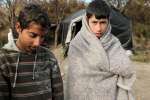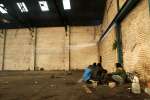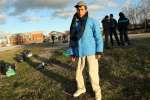- Text size
 |
|  |
|  |
| 
- Français
Summer course in France brings refugee protection to life
Setting the Agenda, 12 July 2010
STRASBOURG, France, July 12 (UNHCR) – Karina Jasmine sobs quietly while telling the story of how she had to flee after receiving death threats because she refused to subject her daughter to genital mutilation in Kilina, her home country. Her story, poignantly told, is not different from thousands of other stories of persecution told by refugees every day around the world. Karina, however, is a fictitious character played by a UNHCR staff member as part of a simulated scenario, which forms part of the training received by participants at UNHCR's Refugee Law summer course in Strasbourg, France.
Bringing together human rights experts, lawyers, teachers, students and professionals from a variety of organisations, the refugee course has been taking place every summer for the last 13 years. It is one of the few courses on international refugee protection available in French and draws a large number of French-speaking participants, from Canada to Kazakhstan, with most of this year's participants coming Africa. After a rigorous selection process, fifty candidates were chosen from over 400 applicants from 33 countries.
The two-week course is organised jointly by UNHCR and the International Institute for Human Rights (IIDH), based in Strasbourg. It includes lectures on refugee law, refugee status determination, durable solutions, refugees in armed conflict and asylum and migration policies around the world.
Practical training includes a simulation exercise where participants have to solve a legal case involving a fictitious individual. Using different criteria for determining refugee status, the participants are asked to judge whether the individual would have been granted refugee status had the situation been real.
"The simulations bring refugee cases to life," says UNHCR's Fadma Moumtaz, who has been playing the role of a refugee woman since the exercise was introduced to the course seven years ago. "They can have a real person in front of them to whom they can ask questions as if they were in a real court of law. Every year participants have different questions and reactions."
The main objective of the course is to improve knowledge of international refugee law among professionals working in the field by teaching them how to identify and respond to individuals in need of international protection. After an examination, successful participants receive a certificate.
"We are very grateful to the French Ministry of Foreign Affairs for funding this course, which is one of the very few of its kind," said Veronique Robert, Senior Protection Officer at the UNHCR Office in Paris. "Besides providing participants with the opportunity to increase their knowledge of refugee issues and international refugee principles, it is a great opportunity for them to meet with other experts coming from different countries and share experiences and best practices in the field of refugee protection".
This year the Refugee Law course took place from 14 to 25 June. The selection process for next year's participants is due to begin in April 2011.
By Alexandra Cwikiel and William Spindler in Paris, France





















































